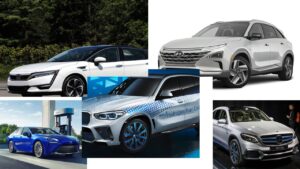Table of Contents
Introduction
Hydrogen-powered vehicles have been making waves in the automotive industry, offering a clean and sustainable alternative to traditional gasoline-powered cars. As the world shifts towards a more eco-friendly future, these innovative vehicles are leading the way. In this blog post, we will explore the top five cars that are at the forefront of this hydrogen revolution.
A Brief History of Hydrogen-Powered Vehicles
Since the early 2000s, hydrogen fuel cell technology has been explored as a viable option for powering vehicles. The concept involves using hydrogen gas to generate electricity, with water vapor as the only emission. This clean energy source has gained traction as automakers seek to reduce their carbon footprint.
The Environmental Benefits of Hydrogen Fuel
Hydrogen-powered vehicles offer significant environmental benefits compared to traditional gasoline cars. With zero tailpipe emissions, they help reduce air pollution and combat climate change. Additionally, hydrogen can be produced from renewable sources, further enhancing the sustainability aspect of these vehicles.
The Challenges of Mass Adoption
Despite their advantages, hydrogen-powered vehicles face challenges in terms of infrastructure and availability. The limited number of hydrogen fueling stations makes it difficult for consumers to access this alternative fuel. Automakers and policymakers are working towards addressing these obstacles to promote the widespread adoption of hydrogen-powered cars.
Car #1: Toyota Mirai
Overview of the Toyota Mirai
The Toyota Mirai is a flagship hydrogen-powered vehicle from the renowned automaker. With its sleek design and advanced technology, the Mirai offers a glimpse into the future of clean transportation.
Performance and Range
Equipped with a powerful fuel cell system, the Mirai delivers impressive performance and range. Drivers can enjoy a smooth and quiet ride while benefiting from the eco-friendly nature of hydrogen fuel.
Infrastructure and Availability
Toyota has been actively working to expand the infrastructure for hydrogen fueling stations, making the Mirai more accessible to consumers. The availability of this vehicle is steadily increasing, paving the way for a hydrogen-powered future.
Car #2: Hyundai Nexo
Features and Technology of the Hyundai Nexo
The Hyundai Nexo embodies cutting-edge technology and innovative features that set it apart in the hydrogen-powered vehicle market. From its futuristic design to its intelligent systems, the Nexo offers a unique driving experience.
Safety and Maintenance
Hyundai prioritizes safety in the Nexo, incorporating advanced safety features to protect both passengers and pedestrians. Additionally, the maintenance of the Nexo is streamlined, ensuring a hassle-free ownership experience for drivers.
Customer Reviews and Industry accolades
The Hyundai Nexo has received rave reviews from customers and industry experts alike. Its performance, design, and eco-friendly credentials have earned it accolades and recognition in the automotive industry.
Car #3: Honda Clarity Fuel Cell
Design and Interior Features
The Honda Clarity Fuel Cell boasts a modern design and spacious interior, offering a comfortable and stylish driving environment. With its attention to detail and premium finishes, the Clarity sets a new standard for hydrogen-powered vehicles.
Fuel Efficiency and Emissions
Honda’s fuel cell technology in the Clarity ensures efficient energy use and minimal emissions. Drivers can enjoy long-range capabilities without compromising on environmental impact, making the Clarity a sustainable choice.
Comparisons with Electric Vehicles
The Honda Clarity Fuel Cell stands out from electric vehicles with its quick refueling time and extended range. This makes it a compelling alternative for drivers who prioritize convenience and performance in their eco-friendly vehicles.

Car #4: Mercedes-Benz GLC F-Cell
Luxury Features and Driving Experience
Mercedes-Benz combines luxury and sustainability in the GLC F-Cell, offering a premium driving experience with a focus on environmental responsibility. The cutting-edge features and refined interiors make the GLC F-Cell a standout in its class.
Price and Cost of Ownership
Despite its luxury appeal, the Mercedes-Benz GLC F-Cell is competitively priced, making it accessible to a wider range of consumers. Additionally, the low operating costs and long-term savings contribute to a compelling cost of ownership proposition.
Global Market Expansion
Mercedes-Benz is actively expanding the availability of the GLC F-Cell in global markets, paving the way for a broader adoption of hydrogen-powered vehicles. The company’s commitment to sustainability and innovation drives its efforts to reach a wider audience.
Car #5: BMW i Hydrogen NEXT
Vision for the Future of Hydrogen-Powered Vehicles
BMW’s i Hydrogen NEXT showcases the company’s vision for the future of mobility, combining hydrogen fuel cell technology with BMW’s signature performance and design. The vehicle exemplifies BMW’s commitment to sustainability and innovation.
Partnerships and Collaborations
BMW has been forging strategic partnerships and collaborations to support the development and adoption of hydrogen-powered vehicles. By working with industry leaders and stakeholders, BMW aims to accelerate the transition towards a hydrogen-powered future.
Potential Impact on the Automotive Industry
The BMW i Hydrogen NEXT has the potential to revolutionize the automotive industry, setting new standards for clean energy vehicles. As more automakers embrace hydrogen fuel cell technology, the industry is poised for significant growth and innovation.
Conclusion
The future of hydrogen-powered vehicles is filled with promise and potential, as evidenced by the pioneering cars highlighted in this blog post. With advancements in technology and a growing focus on sustainability, hydrogen-powered vehicles are poised to play a key role in shaping the future of transportation.
Potential for Innovation and Growth
As automakers and consumers embrace hydrogen fuel cell technology, there is tremendous potential for innovation and growth in the automotive industry. With ongoing developments and investments, hydrogen-powered vehicles are set to drive positive change and environmental impact.
Final Thoughts on the Road Ahead
The road ahead for hydrogen-powered vehicles is paved with possibilities and challenges, but the momentum is strong towards a cleaner and greener future. By continuing to support research, infrastructure development, and consumer education, we can drive the shift towards sustainable transportation.
———****——-
FAQs
- How does a hydrogen fuel cell work?
- What are the advantages of hydrogen-powered vehicles compared to electric vehicles?
- What is the current state of hydrogen fueling infrastructure?
In summary, the article delves into the revolution of hydrogen-powered vehicles, showcasing five leading cars in the industry. Each vehicle is thoroughly examined in terms of design, performance, and impact, providing readers with a comprehensive understanding of the potential of hydrogen fuel in the automotive sector. Followed by a brief conclusion, highlighting the future prospects and challenges in this evolving field, along with a section of frequently asked questions to address common queries on the topic.
———****——-

